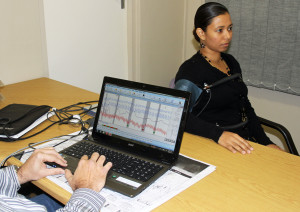 As commercial crime continues to rise, syndicates target vulnerable businesses and applicants manipulate CVs and references, increasing numbers of employers are using pre-employment polygraph tests to screen job applicants. Reg Horne, managing director of leading national private investigation agency, Justicia Investigations, points out that, in the past, polygraph testing was seen as a method of rooting out culprits during in-house investigations into theft, fraud or even sexual harassment. However, employers are now taking proactive rather than reactive routes. “While, five years ago, just 10 percent of companies we dealt with considered pre-employment polygraphs, now up to 60 percent are using this method to screen potential new employees,” he says. “The reason for this is that prevention is easier and far cheaper than solving a problem further down the line,” says Horne. Pre-employment Polygraph Testing Pre-employment polygraph testing is particularly useful in the banking, security, insurance, retail, hospitality, manufacturing, construction, logistics and transport sectors. Entertainment venues – including casinos that test staff such as croupiers – are also regular clients at Justicia. Frans van Biljon, one of Jusitica’s highly qualified and experienced polygrapher, says that although many employees in high risk industries are dismissed for dishonest acts as a result of disciplinary action, most companies don’t prosecute. This means they are not black listed and don’t have criminal records, so any checks often come up blank. This is exacerbated by the fact that a very low percentage – between six and 13 percent – of criminal charges actually end in prosecution. Fellow polygrapher, Willem Marshall, cautions that companies tend to believe that theft, fraud and corruption won’t affect them. “They need to realize that there is a great deal of organised crime out there and that they are being targeted. Syndicates often infiltrate organisations by either arranging a syndicate member to be employed there, or more often, buying over a current employee who might have a clean track record up to that point. Intelligence is everything and criminals share information. Our experience shows that a high percentage of company crime is perpetrated by employees or in collusion with employees.” Van Biljon says that far more people pass polygraph tests than fail – and before even taking a test, up to 80 percent admit to a misdemeanor.
As commercial crime continues to rise, syndicates target vulnerable businesses and applicants manipulate CVs and references, increasing numbers of employers are using pre-employment polygraph tests to screen job applicants. Reg Horne, managing director of leading national private investigation agency, Justicia Investigations, points out that, in the past, polygraph testing was seen as a method of rooting out culprits during in-house investigations into theft, fraud or even sexual harassment. However, employers are now taking proactive rather than reactive routes. “While, five years ago, just 10 percent of companies we dealt with considered pre-employment polygraphs, now up to 60 percent are using this method to screen potential new employees,” he says. “The reason for this is that prevention is easier and far cheaper than solving a problem further down the line,” says Horne. Pre-employment Polygraph Testing Pre-employment polygraph testing is particularly useful in the banking, security, insurance, retail, hospitality, manufacturing, construction, logistics and transport sectors. Entertainment venues – including casinos that test staff such as croupiers – are also regular clients at Justicia. Frans van Biljon, one of Jusitica’s highly qualified and experienced polygrapher, says that although many employees in high risk industries are dismissed for dishonest acts as a result of disciplinary action, most companies don’t prosecute. This means they are not black listed and don’t have criminal records, so any checks often come up blank. This is exacerbated by the fact that a very low percentage – between six and 13 percent – of criminal charges actually end in prosecution. Fellow polygrapher, Willem Marshall, cautions that companies tend to believe that theft, fraud and corruption won’t affect them. “They need to realize that there is a great deal of organised crime out there and that they are being targeted. Syndicates often infiltrate organisations by either arranging a syndicate member to be employed there, or more often, buying over a current employee who might have a clean track record up to that point. Intelligence is everything and criminals share information. Our experience shows that a high percentage of company crime is perpetrated by employees or in collusion with employees.” Van Biljon says that far more people pass polygraph tests than fail – and before even taking a test, up to 80 percent admit to a misdemeanor.
Stop Crime Before It Happens with Pre-employment Polygraph Tests
LATEST POSTS

Justicia Investigations, established in 1992, is a private investigations agency based in Durban and Johannesburg.

